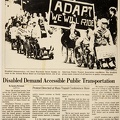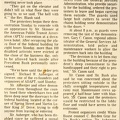Tues., September 26, 1989
[Headline] Disabled Try to Block Access To Elevators
[Subheading] Protesters Continue Russell Building Sit-In
By Alma E. Hill and Pat Burson, Staff Writers
[This is the full text of the story that appears on ADAPT 496, 509 and 488.]
Protesters in wheelchairs moved to block elevators in the Richard B. Russell Federal Building today in their second straight day inside the building, as federal officials increased security.
Ed Driver, chief of law enforcement for the General Services Administration, said six security guards were brought in “so that we can maintain access to and from the building."
“We're not going to do anything, we just want to be able to maintain an element of safety in the building," Mr. Driver said.
At 11:50 a.m., leaders of American Disabled for Accessible Public Transportation (ADAPT) gave the signal and protesters began to chant and roll their wheelchairs in front of the doors on the plaza level of the federal building to restrict access to and from the building, as they had done Monday.
Moments later, in an apparent shift in tactics, the group moved toward elevators to cut off access to upper floors in the high-rise.
Protesters said they will continue to demonstrate until President George Bush or Transportation Secretary Samuel Skinner complies with their demands to issue a federal mandate requiring new buses purchased with federal dollars to be equipped with wheelchair lifts.
Judges who work in the federal building avoided problems getting out of the building by leaving before the noon takeover. And the doors to the Peachtree Federal Employees Credit Union, located in the southwest corner of the building, closed as soon as protesters began to shout.
Visitors are being directed out of the basement and second floor exits.
The Rev. Wade Blank, of Denver, said officials from the Urban Mass Transit Administration came over to the building to meet with pro-
Disabled Group Stages Protest For Wheelchair Lifts on Buses
from page A1 [starts on 496, continues here 509, ends on 488. Overlap with 509 and 488]
...test organizers. However, the meeting never took place.
“They got on the elevator and didn't tell us what floor they were going to. so we said, ‘The hell with it."' the Rev. Blank said.
The protesters began their demonstration Monday to coincide with an appearance by Mr. Skinner at the American Public Transit
Association (APTA) convention at a downtown hotel. After occupying the plaza floor of the federal building for eight hours Monday, more than 100 disabled activists were evicted at the close of the business day, only to be allowed back inside after President Bush personally intervened.
“We're here until the order gets signed." Michael W. Auberger, of Denver, one of the co-founders and organizers of ADAPT, said Monday.
Mr. Auberger and other demonstrators from throughout the country lined their wheelchairs two and three deep near the doorways to the federal building. located at the corner of Spring Street and Martin Luther King Jr. Drive, trying to stop anyone from leaving or entering.
Mr. Auberger, who has been disabled since he suffered a spinal cord injury 17 years ago, and others blocked revolving doors by attaching chains and iron bicycle locks around their necks and locking them to door handles, a tactic used to prevent security from simply lifting protesters out of their wheelchairs to clear the doorways.
At one point Monday afternoon Mr. Auberger, 35, said, “They'll have to carry everybody out or arrest them."
At 6 p.m. Atlanta police and officers from the General Services Administration, who provide security for the building, ordered the protesters to leave and began carrying them outside. The guards used large bolt cutters to sever the chains holding some demonstrators to the doors.
At about 8 p.m., as guards were removing the last of the demonstrators, Gary C. Cason, regional administrator of the General Services Administration, told police and maintenance workers to allow the protesters back into the building.
“The decision is to let them stay in the building because of the president's deep commitment to the handicapped and their right to protest." Mr. Cason said.
Mr. Cason said Mr. Bush also said he was concerned about the protesters sitting outside in the chilly overnight temperatures and rainy mist. Maintenance crews appeared a half-hour later with blankets. Mr. Cason said the protesters would be restricted to the lobby floor and would have access to the restrooms.
Protest organizers credit White House counsel C. Boyden Gray for Mr. Bush's action. Mr. Auberger said they contacted Mr. Gray, who took their case to Mr. Bush.
The president then called the head of the GSA, Richard G. Austin in Washington, telling him to allow the demonstrators back inside.
The protest forced most visitors to the building Monday to use a basement entrance adjacent to an underground parking lot.
Mr. Auberger said the group planned to stay in the building overnight and would block the entrances again at noon if the Transportation Department does not order changes in transit-access rules.
“At noon the administration has to decide whether or not they are going to arrest us, or we’re closing the building down again,” he said shortly before 11 p.m., as the protesters ate Chinese food they had ordered and made themselves comfortable in the hallway on the Spring Street side of the building.
The demonstration was the second in as many days held by ADAPT, a nationwide organization. The event was held in Atlanta to coincide with the annual conference of the American Public Transit Association (APTA), meeting this week in Atlanta, and to attract the attention of U.S. Transportation Secretary Samuel K. Skinner, who spoke to APTA Monday morning.
APTA opposes legislation pending in Congress — that ADAPT supports — called the Americans With Disabilities Act. The proposal would remove barriers in public transportation by requiring public transit authorities to have wheelchair lifts on any new buses purchased 30 days after the measure was enacted. APTA officials say they oppose that portion of the measure because it would cut into limited federal funds.
While Mr. Skinner has said he supports the bill, ADAPT wants him to issue an executive order so the stipulation can take effect immediately — prior to congressional action. Protesters demanded to talk with Mr. Skinner while he was in Atlanta, but Mr. Skinner departed for St. Croix without meeting with them. Robert Marx, a spokesman for Mr. Skinner, said the secretary does not have the authority to issue such an order, only the president.
Spokesmen for ADAPT believe Mr. Skinner is not championing their cause because of a lawsuit the group won against the Chicago Transit Authority (CTA) two years ago, when Mr. Skinner was chairman of the city's Regional Transportation Authority. The court ruling required the CTA to purchase wheelchair lifts when ordering new buses.
Photo: Looking down the long narrow glass walled lobby. In the foreground a man is lying bundled in a blanket on the floor. Beside him his motorized wheelchair sits empty. A little further back in the lobby several people sit in their wheelchairs and scooters by a cardboard box and some bags and papers.
photo by ANDY SHARP
caption: Woody Osburn of Tulsa, sleeping, and others, seen early today in the Russell Building.
- Created on
- Friday 12 July 2013
- Posted on
- Wednesday 8 April 2015
- Tags
- accessible transit, ADA, ADAPT, Atlanta, fall 1989, protest, Richard B Russell Federal Building, Wade Blank, wheelchairs
- Albums
- Visits
- 4041
- Rating score
- 4.37 (1 rate)
- Rate this photo


0 comments